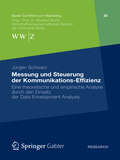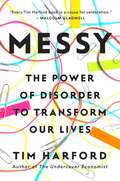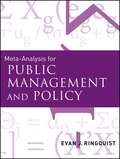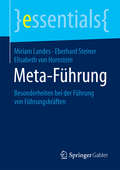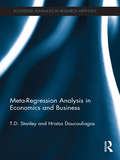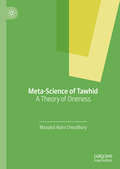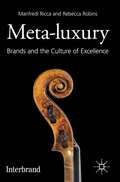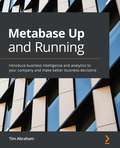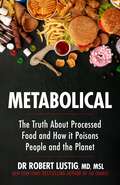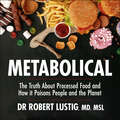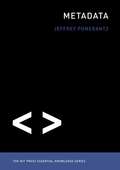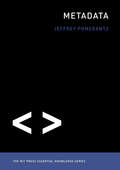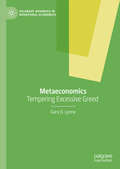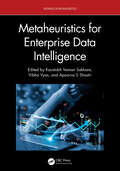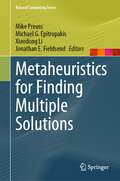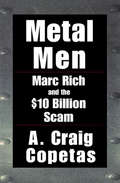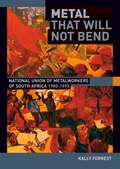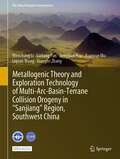- Table View
- List View
Messung und Steuerung der Kommunikations-Effizienz
by Jürgen SchwarzDer zunehmende Wettbewerbsdruck in allen Branchen zwingt Unternehmen ihre Marketingbudgets nicht nur effektiv sondern auch möglichst effizient einzusetzen. Vor allem im Kommunikationscontrolling wird vermehrt eine systematische Messung und Steuerung der Kommunikations-effizienz gefordert, die transparent und nachvollziehbar ist. Jürgen Schwarz identifiziert eine vielversprechende Methode und überprüft deren Anwendbarkeit zur Messung der Kommunikationseffizienz sowohl theoretisch als auch im Rahmen empirischer Studien. Der Autor liefert Erkenntnisse für die Anwendung der Methode und leitet Handlungsempfehlungen für das Kommunikationscontrolling sowie Implikationen für die Messung der Kommunikationseffizienz ab.
Messy: The Power of Disorder to Transform Our Lives
by Tim Harford"Utterly fascinating. Tim Harford shows that if you want to be creative and resilient, you need a little more disorder in your world." --Adam Grant, New York Times-bestselling author of Originals and Give and TakeFrom the award-winning columnist and author of the national bestseller The Undercover Economist comes a provocative big idea book about the genuine benefits of being messy: at home, at work, in the classroom, and beyond.Messy: The Power of Disorder to Transform Our Lives celebrates the benefits that messiness has in our lives: why it's important, why we resist it, and why we should embrace it instead. Using research from neuroscience, psychology, social science, as well as captivating examples of real people doing extraordinary things, Tim Harford explains that the human qualities we value - creativity, responsiveness, resilience - are integral to the disorder, confusion, and disarray that produce them. From the music studio of Brian Eno to the Lincoln Memorial with Martin Luther King, Jr., from the board room to the classroom, messiness lies at the core of how we innovate, how we achieve, how we reach each other - in short, how we succeed. In Messy, you'll learn about the unexpected connections between creativity and mess; understand why unexpected changes of plans, unfamiliar people, and unforeseen events can help generate new ideas and opportunities as they make you anxious and angry; and come to appreciate that the human inclination for tidiness - in our personal and professional lives, online, even in children's play - can mask deep and debilitating fragility that keep us from innovation. Stimulating and readable as it points exciting ways forward, Messy is an insightful exploration of the real advantages of mess in our lives.From the Hardcover edition.
Messy: The Power of Disorder to Transform Our Lives
by Tim Harford“Utterly fascinating. Tim Harford shows that if you want to be creative and resilient, you need a little more disorder in your world.” —Adam Grant, New York Times-bestselling author of Originals and Give and Take“Engrossing.” —New York TimesFrom the award-winning columnist and author of the national bestseller The Undercover Economist comes a provocative big idea book about the genuine benefits of being messy: at home, at work, in the classroom, and beyond.Look out for Tim's next book, Fifty Inventions That Shaped the Modern Economy.Messy: The Power of Disorder to Transform Our Lives celebrates the benefits that messiness has in our lives: why it’s important, why we resist it, and why we should embrace it instead. Using research from neuroscience, psychology, social science, as well as captivating examples of real people doing extraordinary things, Tim Harford explains that the human qualities we value – creativity, responsiveness, resilience – are integral to the disorder, confusion, and disarray that produce them. From the music studio of Brian Eno to the Lincoln Memorial with Martin Luther King, Jr., from the board room to the classroom, messiness lies at the core of how we innovate, how we achieve, how we reach each other – in short, how we succeed. In Messy, you’ll learn about the unexpected connections between creativity and mess; understand why unexpected changes of plans, unfamiliar people, and unforeseen events can help generate new ideas and opportunities as they make you anxious and angry; and come to appreciate that the human inclination for tidiness – in our personal and professional lives, online, even in children’s play – can mask deep and debilitating fragility that keep us from innovation. Stimulating and readable as it points exciting ways forward, Messy is an insightful exploration of the real advantages of mess in our lives.
Meta-Analysis for Public Management and Policy
by Evan RingquistPraise for Meta-Analysis for Public Management and Policy "In his usual rigorous but readable style, Evan Ringquist and co-author Mary Anderson have produced a tour-de-force on the topic of meta-analysis in public policy and management research. Meta-analysis is badly needed in the all-too-common situation when researchers have low confidence in summarizing the overall results of dozens of studies on the effectiveness of some policy. This book has a nice combination of conceptual overview, methodological details, and applications that will make it possible for researchers to conduct their own meta-analysis. It is tempting to require all graduate students to write a meta-analysis as a chapter in their dissertation, or include meta-analysis as a standard offering in the research methods curriculum of social science graduate programs. The more people that adopt Ringquist and Anderson's approach, the less resources will be wasted on conducting studies that do not contribute to cumulative scientific knowledge. " --Mark Lubell Department of Environmental Science and Policy Director, Center for Environmental Policy and Behavior University of California-Davis "Ringquist and his colleagues deliver value and add to canon of public management methods by delivering an analytical framework that makes the case for systematic research using the tools of meta-analysis. This book will be a must read for all committed to strengthening evidence-based research that improves public policy and management decision making." --David M. Van Slyke The Maxwell School of Citizenship and Public Affairs Syracuse University "In Meta-Analysis for Public Management and Policy Evan Ringquist and his colleagues provide a lucid and practical roadmap for policy and public management scholars who use meta-analysis in their research. But this is more than a "how to" volume; it provides background on why meta-analysis is a potent means for accumulating and synthesizing empirical research findings, and shows how its use has evolved in recent decades. Specific applications of meta-analysis to long-standing policy and management debates are given, essentially providing an array of developed "templates" through which scholars and practitioners can assess how to approach different kinds of analytical problems using meta-analysis. Particularly valuable to me is the careful development and presentation of the necessary stages of meta-analysis, from conceptualization through data coding and bias assessment to advanced modeling. All of the statistical analyses can be conducted in Stata, utilizing readily available ".ado" modules. I will use this book, both in research and in the classroom. Overall it is one of the most useful methodological contributions I've seen in some time." --Hank Jenkins-Smith Department of Political Science Director, Center for Applied Social Research University of Oklahoma "Meta-Analysis for Public Management and Policy conveys the considerable untapped potential of meta-analysis to strengthen and advance bodies of knowledge and evidence in public management and policy. This book takes students and researchers deep into the methods of meta-analysis and details of their empirical application, without losing sight of the important policy questions and the implications of choices that researchers make in their empirical work for the production of evidence for public managers and policymakers. This book will serve as an excellent practical guide for those conducting their first meta-analysis, while at the same time supporting critically-focused consumption of existing meta-analyses and discussion of where the field can gainfully take this approach to enhance our research and knowledge bascial science researchers and students as well." --Carolyn Heinrich Sid Richardson Professor of Public Affairs Director, Center for Health and Social Policy LBJ School of Public Affairs University of Texas - Austin "Even for incredibly specialized techniques, public management and policy scholars have a multiplicity of methods texts from which to choose. Yet it...
Meta-Führung: Besonderheiten bei der Führung von Führungskräften (essentials)
by Miriam Landes Eberhard Steiner Elisabeth Von HornsteinIn diesem Essential werden die grundlegenden Unterschiede zwischen der Führung von Mitarbeitern mit und ohne Führungsaufgaben analysiert und die bekannten Führungsstile auf ihre Eignung für die Führung von Führungskräften untersucht. Mit dem Hemisphärenmodell der Führung von Führungskräften wird ein Schema vorgestellt, das die verschiedenen Anforderungen an Vorgesetzte von Führungskräften kategorisiert und in vier Teilbereiche einordnet. Abschließend werden Trends im Kontext der Meta-Führung beschrieben, die integraler Bestandteil der Management- und Leadership-Ausbildung werden sollten.
Meta-Regression Analysis in Economics and Business (Routledge Advances In Research Methods Ser. #5)
by Hristos Doucouliagos T.D. StanleyThe purpose of this book is to introduce novice researchers to the tools of meta-analysis and meta-regression analysis and to summarize the state of the art for existing practitioners. Meta-regression analysis addresses the rising "Tower of Babel" that current economics and business research has become. Meta-analysis is the statistical analysis of previously published, or reported, research findings on a given hypothesis, empirical effect, phenomenon, or policy intervention. It is a systematic review of all the relevant scientific knowledge on a specific subject and is an essential part of the evidence-based practice movement in medicine, education and the social sciences. However, research in economics and business is often fundamentally different from what is found in the sciences and thereby requires different methods for its synthesis—meta-regression analysis. This book develops, summarizes, and applies these meta-analytic methods.
Meta-Science of Tawhid: A Theory of Oneness
by Masudul Alam ChoudhuryThis book explores the methodological foundation of Islamic thought premised on the cardinal principle of Tawhid, meaning the Oneness of God as the universal law. The consequential methodological worldview arising from the monotheistic unity of knowledge is explained as the theory of consilience, meaning unity of knowledge as the primal ontological reality leading to its epistemological and phenomenological essentials of reasoning and thereby configuring reality. Masudul Alam Choudhury presents a non-mathematical exposition of the theory and applications of Meta-Science of Tawhid, and brings out the essential monotheistic methodological worldview of science.
Meta-luxury
by Manfredi Ricca Rebecca RobinsMeta-Luxury sets out to define the ultimate meaning of true luxury, exploring it as both a culture and business model. Through the concept of Unique Achievement and the drivers of Craftsmanship, Focus, History and Rarity, the authors examine what is at the heart of true luxury through a unique series of conversations.
Metabase Up and Running: Introduce Business Intelligence And Analytics To Your Company And Make Better Business Decisions
by Tim AbrahamThis book is for business analysts, data analysts, data scientists, and other professionals who want to become well-versed with business intelligence and analytics using Metabase. This book will also appeal to anyone who wants to understand their data and extract meaningful insights from scratch using practical examples. A basic understanding of data handling and processing will be beneficial before you get started with this book.
Metabical: Positioning and Communications Strategy for a New Weight Loss Drug (Brief Case)
by John A. Quelch Heather BeckhamCambridge Sciences Pharmaceuticals (CSP) expects final approval for its revolutionary weight loss drug, Metabical. Metabical will be the only weight loss drug with FDA approval that is also clinically proven to be effective for moderately overweight people. Barbara Printup, Senior Marketing Director for CSP, must develop the positioning strategy and marketing communications plan in preparation for the launch of the new drug. Printup must consider the consumer decision-making process and the interaction between the consumer who purchases the drug and the health care provider who prescribes the medication. Despite promising medical studies and consumer research, poor positioning of the drug in the highly competitive market for weight-loss solutions could spell disaster. Students analyze market research data and consider the optimal positioning strategy and marketing communications program.
Metabical: Pricing, Packaging, and Demand Forecasting for a New Weight-Loss Drug
by John A. Quelch Heather BeckhamMetabical is a new weight loss drug from Cambridge Sciences Pharmaceuticals intended for moderately overweight individuals. In anticipation of final FDA approval, the senior director of marketing, Barbara Printup, prepares for the product launch and must make several critical decisions. First, she must select the optimal packaging size for the drug which typically requires a 12-week course of treatment. Next, she must determine the appropriate pricing. Since most insurance companies do not cover weight-loss medications, price has a direct impact on the sales forecast. To establish the initial demand forecast, Printup considers three approaches based on different assumptions. Her final recommendations must consider long term profitability and meet the company's desired return on investment.The case includes a quantitative assignment for students.
Metabolical: The truth about processed food and how it poisons people and the planet
by Dr Robert LustigDid you know that 62% of the food in our supermarkets is not only processed but 'ultra-processed' (ingredients from other foods are combined to make something 'new', often in colours that do not exist in nature) and that data shows that by eating this kind of food over time we are literally slowly poisoning ourselves?In the hard-hitting, ground-breaking tradition of his NY Times bestseller FAT CHANCE, which revealed the dangers of sugar, Dr Robert Lustig persuasively presents a stark exposé of how our addiction to processed foods (aided and abetted by the food industry, big ag, big pharma, institutional medicine and the government) is behind the lethal increase in major non-communicable diseases, including diabetes, heart disease, fatty liver disease, cancer and dementia. We have come to accept that these chronic diseases are simply part of the 'natural ageing process', but Dr Lustig makes the case that this is simply not true. The solution on both a personal and societal level is a return to unprocessed food and Dr Lustig offers a doable plan for us to heal and restore our own health and wellbeing with real food, and in the process boosting our immunity to viruses like Covid-19.'Metabolical lays bare the depth of the relationship between the recent and profound perversion of the human diet and its overwhelming health consequences.' Dr David Perlmutter, author of the #1 New York Times bestsellers Grain Brain and Brain Wash
Metabolical: The truth about processed food and how it poisons people and the planet
by Dr Robert LustigIt's not what you eat that's damaging your health it's how that food is 'made'. The truth behind ultra-processed food that the food industry doesn't want you to know.Did you know that 62% of the food in our supermarkets is not only processed but 'ultra-processed' (ingredients from other foods are combined to make something 'new', often in colours that do not exist in nature) and that data shows that by eating this kind of food over time we are literally slowly poisoning ourselves?In the hard-hitting, ground-breaking tradition of his NY Times bestseller FAT CHANCE, which revealed the dangers of sugar, Dr Robert Lustig persuasively presents a stark exposé of how our addiction to processed foods (aided and abetted by the food industry, big ag, big pharma, institutional medicine and the government) is behind the lethal increase in major non-communicable diseases, including diabetes, heart disease, fatty liver disease, cancer and dementia. We have come to accept that these chronic diseases are simply part of the 'natural ageing process', but Dr Lustig makes the case that this is simply not true. The solution on both a personal and societal level is a return to unprocessed food and Dr Lustig offers a doable plan for us to heal and restore our own health and wellbeing with real food, and in the process boosting our immunity to viruses like Covid-19.(P) 2021 HarperCollins Publishers
Metadata
by Jeffrey PomerantzWhen "metadata" became breaking news, appearing in stories about surveillance by the National Security Agency, many members of the public encountered this once-obscure term from information science for the first time. Should people be reassured that the NSA was "only" collecting metadata about phone calls -- information about the caller, the recipient, the time, the duration, the location -- and not recordings of the conversations themselves? Or does phone call metadata reveal more than it seems? In this book, Jeffrey Pomerantz offers an accessible and concise introduction to metadata. In the era of ubiquitous computing, metadata has become infrastructural, like the electrical grid or the highway system. We interact with it or generate it every day. It is not, Pomerantz tell us, just "data about data." It is a means by which the complexity of an object is represented in a simpler form. For example, the title, the author, and the cover art are metadata about a book. When metadata does its job well, it fades into the background; everyone (except perhaps the NSA) takes it for granted.Pomerantz explains what metadata is, and why it exists. He distinguishes among different types of metadata -- descriptive, administrative, structural, preservation, and use -- and examines different users and uses of each type. He discusses the technologies that make modern metadata possible, and he speculates about metadata's future. By the end of the book, readers will see metadata everywhere. Because, Pomerantz warns us, it's metadata's world, and we are just living in it.
Metadata Processes: What They Are and How to Use Them
by Thomas C. RedmanMetadata processes are those processes through which data about data are developed and kept current. This appendix provides an overview of three metadata processes: data cataloging, data modeling, and data standards.
Metadata: The Mit Press Essential Knowledge Series (The MIT Press Essential Knowledge series)
by Jeffrey PomerantzEverything we need to know about metadata, the usually invisible infrastructure for information with which we interact every day. When “metadata” became breaking news, appearing in stories about surveillance by the National Security Agency, many members of the public encountered this once-obscure term from information science for the first time. Should people be reassured that the NSA was “only” collecting metadata about phone calls—information about the caller, the recipient, the time, the duration, the location—and not recordings of the conversations themselves? Or does phone call metadata reveal more than it seems? In this book, Jeffrey Pomerantz offers an accessible and concise introduction to metadata.In the era of ubiquitous computing, metadata has become infrastructural, like the electrical grid or the highway system. We interact with it or generate it every day. It is not, Pomerantz tell us, just “data about data.” It is a means by which the complexity of an object is represented in a simpler form. For example, the title, the author, and the cover art are metadata about a book. When metadata does its job well, it fades into the background; everyone (except perhaps the NSA) takes it for granted.Pomerantz explains what metadata is, and why it exists. He distinguishes among different types of metadata—descriptive, administrative, structural, preservation, and use—and examines different users and uses of each type. He discusses the technologies that make modern metadata possible, and he speculates about metadata's future. By the end of the book, readers will see metadata everywhere. Because, Pomerantz warns us, it's metadata's world, and we are just living in it.
Metaeconomics: Tempering Excessive Greed (Palgrave Advances in Behavioral Economics)
by Gary D. LynneThis book presents the Metaeconomics Framework and Dual Interest Theory, which weave the empathy-based moral and ethical dimension back into key economic questions. Metaeconomics addresses the problem of placing too much emphasis on the market or the government, and thus argues that seeing the link between ego and empathy, self- and other-interest, and market and government will lead to a more just, fair, and sustainable polity. The unique Dual Interest Theory proposes that ego-based self-interest and empathy-based other-interest are joint and internal to each person: it maintains the original proposition from Adam Smith that each person maximizes their own-interest, which Metaeconomics makes clear involves balancing the two joint interests, although self-interest is more primal. The book begins with an explanation of how Metaeconomics connects the other kinds of economics. The book then provides a series of applications of Metaeconomics in heated policy issues, such as elections, finance, family, food, health, natural resources, education, taxes, and extreme inequality, among others. Finally, the book concludes that the only way to save capitalism is to bring empathy into both private and public actions and bring about a more humane balance in market and government.
Metaheuristics for Enterprise Data Intelligence (Advances in Metaheuristics)
by Apoorva S Shastri Kaustubh Vaman Sakhare Vibha VyasWith the emergence of the data economy, information has become integral to business excellence. Every enterprise, irrespective of its domain of interest, carries and processes a lot of data in their day-to-day activities. Converting massive datasets into insightful information plays an important role in developing better business solutions. Data intelligence and its analysis pose several challenges in data representation, building knowledge systems, issue resolution and predictive systems for trend analysis and decisionmaking. The data available could be of any modality, especially when data is associated with healthcare, biomedical, finance, retail, cybersecurity, networking, supply chain management, manufacturing, etc. The optimization of such systems is therefore crucial to leveraging the best outcomes and conclusions. To this end, AI-based nature-inspired optimization methods or approximation-based optimization methods are becoming very powerful. Notable metaheuristics include genetic algorithms, differential evolution, ant colony optimization, particle swarm optimization, artificial bee colony, grey wolf optimizer, political optimizer, cohort intelligence and league championship algorithm. This book provides a systematic discussion of AI-based metaheuristics application in a wide range of areas, including big data intelligence and predictive analytics, enterprise analytics, graph optimization algorithms, machine learning and ensemble learning, computer vision enterprise practices and data benchmarking.
Metaheuristics for Finding Multiple Solutions (Natural Computing Series)
by Xiaodong Li Mike Preuss Michael G. Epitropakis Jonathan E. FieldsendThis book presents the latest trends and developments in multimodal optimization and niching techniques. Most existing optimization methods are designed for locating a single global solution. However, in real-world settings, many problems are “multimodal” by nature, i.e., multiple satisfactory solutions exist. It may be desirable to locate several such solutions before deciding which one to use. Multimodal optimization has been the subject of intense study in the field of population-based meta-heuristic algorithms, e.g., evolutionary algorithms (EAs), for the past few decades. These multimodal optimization techniques are commonly referred to as “niching” methods, because of the nature-inspired “niching” effect that is induced to the solution population targeting at multiple optima. Many niching methods have been developed in the EA community. Some classic examples include crowding, fitness sharing, clearing, derating, restricted tournament selection, speciation, etc. Nevertheless, applying these niching methods to real-world multimodal problems often encounters significant challenges.To facilitate the advance of niching methods in facing these challenges, this edited book highlights the latest developments in niching methods. The included chapters touch on algorithmic improvements and developments, representation, and visualization issues, as well as new research directions, such as preference incorporation in decision making and new application areas. This edited book is a first of this kind specifically on the topic of niching techniques.This book will serve as a valuable reference book both for researchers and practitioners. Although chapters are written in a mutually independent way, Chapter 1 will help novice readers get an overview of the field. It describes the development of the field and its current state and provides a comparative analysis of the IEEE CEC and ACM GECCO niching competitions of recent years, followed by a collection of open research questions and possible research directions that may be tackled in the future.
Metal Men: Marc Rich and the $10 Billion Scam
by A. Craig CopetasThis true story of the multibillionaire who fled to Switzerland &“reads like a mystery novel&” (USA Today). How did Marc Rich make over ten billion dollars while paying hardly any taxes? Journalist A. Craig Copetas infiltrated the inner circle of the commodities market and Rich&’s associates to show not only how the metals and minerals trader pulled off the scam, becoming one of America&’s most wanted criminals, but also how other traders have used the same model to evade taxes as well. A continuing figure of controversy even after his death, Rich, a hedge fund manager and the founder of Glencore, was wanted for evading almost ninety million dollars in taxes and if caught, could have spent life in prison. From a former staff reporter at The Wall Street Journal, Metal Men is a story of international intrigue spanning the globe, from the inside of the White House to the Kremlin, a brilliantly researched work that exposes the inner workings of one of country&’s largest scams. &“Mr. Copetas is at his best evoking the high-stakes, fast-paced life of the commodities traders: the greed and corruption that consume them are the stuff of high drama.&” —The New York Times Book Review
Metal that Will not Bend: The National Union of Metalworkers of South Africa, 1980-1995
by Kally ForrestIn the 1980s there was a surge of trade union power in South Africa. The National Union of Metalworkers of South Africa (Numsa) was prominent and innovative in this assertion of muscle.Metal that does not Bend traces Numsa’s accumulation, from a few small unions in a handful of factories to the staging of national strikes involving thousands of workers in auto and engineering. It examines how the union used its influence in macroeconomic and political arenas. Numsa was Cosatu’s most radical socialist affiliate, and the book explores its attempts to implement its vision. Historians have framed apartheid’s downfall as resulting from the activities of the exiled liberation movement, global anti-apartheid boycott strategies and internal township insurrection. This book reasserts the critical role of the internal labour movement.
Metalcraft Supplier Scorecard
by V. G. Narayanan Susan Kulp Ronald L. VerkleerenAn automotive components company uses a supplier scorecard to make sourcing decisions and review its supplier performance.
Metallogenic Theory and Exploration Technology of Multi-Arc-Basin-Terrane Collision Orogeny in “Sanjiang” Region, Southwest China (The China Geological Survey Series)
by Wenchang Li Guitang Pan Zengqian Hou Xuanxue Mo Liquan Wang Xiangfei ZhangThis open access book presents a new structural model of “multi-arc-basin-terrane system” based on the in-depth research of the Nujiang-Lancangjiang-Jinshajiang region, especially several Paleo-Tethys ophiolitic mélange belts and sets of arc-basin systems, and a new orogenic model of “The Hengduan shan Mountains” based on penetrated research on spatial-temporal framework and orogenic models of different orogenic belts under large-scale strike-slip-shear-nappe structures evolution. The authors paid special attention on the coupling relation between orogeny and metallogenesis. The metallogenesis and dynamic process are probed under the crust–mantle interaction and material-energy exchange-transmission background and the tectonic units evolution. The ore genesis and distribution of deposits have been thoroughly analyzed, and the metallogenic theories of "multi-arc-basin-terrane" and "intracontinental tectonic transformation" in the Nujiang-Lancangjiang-Jinshajiang region have been carried out. This book also illustrates how to explore metallic deposits in the Nujiang-Lancangjiang-Jinshajiang region by using the metallogenic regulations. Meanwhile, this book has high reference value for researchers working in the fields of basic geology, environmental geology, and energy geology.
Metals, Culture and Capitalism
by Jack GoodyMetals, Culture and Capitalism is an ambitious, broad-ranging account of the search for metals in Europe and the Near East from the Bronze Age to the Industrial Revolution and the relationship between this and economic activity, socio-political structures and the development of capitalism. Continuing his criticism of Eurocentric traditions, a theme explored in The Theft of History (2007) and Renaissances (2009), Jack Goody takes the Bronze Age as a starting point for a balanced account of the East and the West, seeking commonalities that recent histories overlook. Considering the role of metals in relation to early cultures, the European Renaissance and 'modernity' in general, Goody explores how the search for metals entailed other forms of knowledge, as well as the arts, leading to changes that have defined Europe and the contemporary world. This landmark text, spanning centuries, cultures and continents, promises to inspire scholars and students across the social sciences.
Metapath Software: September 1997
by Bill Wasik G. Felda HardymonIn September 1997, John Hansen called together his board to debate an interesting choice that his company had to make. Hansen--the CEO of Metapath Software, a provider of software and services to wireless carriers--had two offers to describe. The first was an offer to be acquired by CellTech Communications, a wireless products company which had only recently gone public. Under the terms of the deal, Metapath's shareholders would at closing receive common stock in CellTech valued at $115 million. CellTech at that time had a market capitalization of approximately $260 million. The second offer was from a consortium of investors led by Robertson & Stephens Omega Fund and Technology Crossover Ventures to buy $11.75 million of stock at a $76 million pre-money valuation. The terms of the preferred stock the funds were proposing to buy were much stricter than the terms of the stock owned by existing shareholders.
